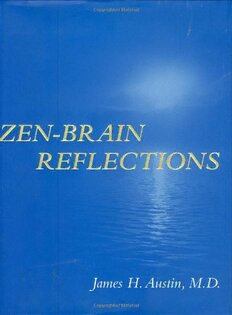Download Zen-Brain Reflections PDF Free - Full Version
Download Zen-Brain Reflections by James H. Austin in PDF format completely FREE. No registration required, no payment needed. Get instant access to this valuable resource on PDFdrive.to!
About Zen-Brain Reflections
This sequel to the widely read Zen and the Brain continues James Austin's explorations into the key interrelationships between Zen Buddhism and brain research. In Zen-Brain Reflections, Austin, a clinical neurologist, researcher, and Zen practitioner, examines the evolving psychological processes and brain changes associated with the path of long-range meditative training. Austin draws not only on the latest neuroscience research and new neuroimaging studies but also on Zen literature and his personal experience with alternate states of consciousness.Zen-Brain Reflections takes up where the earlier book left off. It addresses such questions as: how do placebos and acupuncture change the brain? Can neuroimaging studies localize the sites where our notions of self arise? How can the latest brain imaging methods monitor meditators more effectively? How do long years of meditative training plus brief enlightened states produce pivotal transformations in the physiology of the brain? In many chapters testable hypotheses suggest ways to correlate normal brain functions and meditative training with the phenomena of extraordinary states of consciousness.After briefly introducing the topic of Zen and describing recent research into meditation, Austin reviews the latest studies on the amygdala, frontotemporal interactions, and paralimbic extensions of the limbic system. He then explores different states of consciousness, both the early superficial absorptions and the later, major "peak experiences." This discussion begins with the states called kensho and satori and includes a fresh analysis of their several different expressions of "oneness." He points beyond the still more advanced states toward that rare ongoing stage of enlightenment that is manifest as "sage wisdom."Finally, with reference to a delayed "moonlight" phase of kensho, Austin envisions novel links between migraines and metaphors, moonlight and mysticism. The Zen perspective on the self and consciousness is an ancient one. Readers will discover how relevant Zen is to the neurosciences, and how each field can illuminate the other.
Detailed Information
| Author: | James H. Austin |
|---|---|
| Publication Year: | 2006 |
| ISBN: | 9780262012232 |
| Pages: | 615 |
| Language: | English |
| File Size: | 6.058 |
| Format: | |
| Price: | FREE |
Safe & Secure Download - No registration required
Why Choose PDFdrive for Your Free Zen-Brain Reflections Download?
- 100% Free: No hidden fees or subscriptions required for one book every day.
- No Registration: Immediate access is available without creating accounts for one book every day.
- Safe and Secure: Clean downloads without malware or viruses
- Multiple Formats: PDF, MOBI, Mpub,... optimized for all devices
- Educational Resource: Supporting knowledge sharing and learning
Frequently Asked Questions
Is it really free to download Zen-Brain Reflections PDF?
Yes, on https://PDFdrive.to you can download Zen-Brain Reflections by James H. Austin completely free. We don't require any payment, subscription, or registration to access this PDF file. For 3 books every day.
How can I read Zen-Brain Reflections on my mobile device?
After downloading Zen-Brain Reflections PDF, you can open it with any PDF reader app on your phone or tablet. We recommend using Adobe Acrobat Reader, Apple Books, or Google Play Books for the best reading experience.
Is this the full version of Zen-Brain Reflections?
Yes, this is the complete PDF version of Zen-Brain Reflections by James H. Austin. You will be able to read the entire content as in the printed version without missing any pages.
Is it legal to download Zen-Brain Reflections PDF for free?
https://PDFdrive.to provides links to free educational resources available online. We do not store any files on our servers. Please be aware of copyright laws in your country before downloading.
The materials shared are intended for research, educational, and personal use in accordance with fair use principles.

